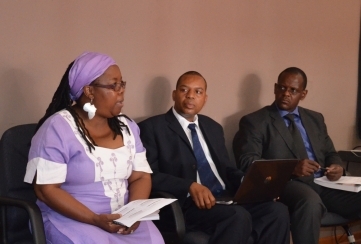
The 2014 Global Go To Think Tank Index Report has ranked 23 think tanks supported by the African Capacity Building Foundation (ACBF) among the best 65 in sub-Saharan Africa. The Report, released on 22 January 2015 by the Think Tanks and Civil Societies Program (TTCSP) at the University of Pennsylvania, ranks the performance of policy institutes worldwide.
The Report launch took place simultaneously in 81 organizations in 51 countries worldwide. ACBF partnered with TTCSP on the national launch in Zimbabwe, and brought together 50 experts from think tanks, academia, Civil Society Organizations (CSOs), media and policymakers at its headquarters in Harare.
The Global Go To Think Tank Index Report aims to foster efficient policy dialogue and exchange, as well as sharing of experiences and good understanding of the role and importance of the think tanks.
In a video statement on the global launch, James McGann, PhD, Director of the University of Pennsylvania’s TTCSP and Civil Societies Program, said that it was critical to know where to turn for sound policy proposals that address the complex policy issues. Pointing out the importance of the report, he said, “This independent Index is designed to help identify and recognize the leading centers of excellence in public policy research around the world.”
Speaking at the launch, Dr. Robert Nantchouang, Officer-in-charge of the ACBF Knowledge, Monitoring and Evaluation Department expressed his satisfaction seeing the Kenya Institute for Public Policy Research and Analysis, (KIPPRA) as the best ranked think tank in sub-Saharan Africa. KIPPRA is an ACBF-supported institution.
Dr Roger Atindehou, who represented the ACBF Executive Secretary, reaffirmed the commitment of ACBF in supporting the development of think tanks in Africa and announced the upcoming Second African Think Tanks Summit planned for 6-8 April 2015 in Addis Ababa, Ethiopia, in partnership with the TTCSP, United Nations Economic Commission for Africa (ECA) and the Think Tank Initiative.
Findings from the 2014 Global Go To Think Tank Index Report show a global reduction in the number of think tanks in the world in general and in sub-Saharan Africa in particular. Such a decrease is mainly related to funding issues, complex and hostile environments, and challenges associated with globalization and competition.
The event aimed to share the key findings of the 2014 Report, exchange viewpoints on the rankings of think tanks, and highlight the role of ACBF in the development of and support to think tanks in Africa.
During discussions at the launch, participants expressed their desire to see ACBF continue to support the creation of think tanks and the strengthening of their capacities so that they can conduct quality policy research that will shape the policy directions and positively impact the life of African people.
An important call from participants was the necessity and hope that ACBF will develop more think tanks in Zimbabwe, its host country. Besides, some participants encouraged the Foundation to get more involved in initiatives related to advocacy and raising awareness on the importance and role of think tanks in shaping policy direction.
Since its inception in 1991, ACBF has pioneered in the development of and support to think tanks across Africa. Today, the Foundation is supporting 33 think tanks which have become the first point of call for policy research products and technical advisory services by key stakeholders in the continent.
The TTCSP at the International Relations Program, University of Pennsylvania conducts research on the role policy institutes play in governments and civil societies around the world. TTCSP was established in 1989. The Program maintains a database and network of over 6,600 think tanks in 152 countries. Often referred to as the “think tanks’ think tank,” TTCSP examines the evolving role and character of public policy research organizations.
The 23 ACBF supported organizations ranked in the 2014 Global Go To Think Tank Report are:
- Kenya Institute for Public Policy Research and Analysis (KIPPRA), Kenya (No.1)
- Council for the Development of Social Science Research in Africa (CODESRIA), Senegal (No.4)
- Botswana Institute for Development Policy Analysis (BIDPA), Botswana (No. 5)
- Centre for Policy Analysis (CEPA), Ghana (No. 10)
- African Economic Research Consortium (AERC), Kenya (No. 11)
- Food, Agriculture and Natural Resources Policy Analysis Network (FANRPAN), South Africa (No. 13)
- Ethiopian Development Research Institute (EDRI), Ethiopia (No. 15)
- Economic Policy Research Center (EPRC), Uganda (No. 16)
- Ethiopian Economics Association (EEA), Ethiopia (No. 17)
- Centre Ivoirien de Recherches Economiques et Sociales (CIRES), Cote d’Ivoire (No. 28)
- Institute of Statistical, Social and Economic Research (ISSER), Ghana (No.34)
- Economic and Social Research Foundation (ESRF), Tanzania (No.42)
- Strategic Transformation and Policy Centre (STPC), Cabo Verde (No. 45)
- Centre d’Etudes de Politiques pour le Développement (CEPOD), Senegal (No. 46)
- Programme de Troisième Cycle Inter-universitaire en Economie (PTCI), Burkina Faso (No.48)
- Institute of Policy Analysis and Research (IPAR), Kenya (No. 54)
- Centre de Recherches, d’Etudes et d’Appui à l’Analyse Economique à Madagascar (CREAM), Madagascar (No. 55)
- Centre Autonome d’Etudes et de Renforcement des Capacités pour le Développement au Togo (CADERDT), Togo (No.56)
- Nigerian Institute for Social and Economic Research (NISER), Nigeria (No.57)
- Macroeconomic and Financial Management Institute of Eastern and Southern Africa (MEFMI), Zimbabwe (No. 58)
- Mandela Institute for Development Studies (MINDS), South Africa (No. 59)
- Swaziland Economic Policy Analysis and Research Centre (SEPARC), Swaziland (No. 62)
- Institute for Policy Analysis and Research (IPAR), Rwanda (No.63)





